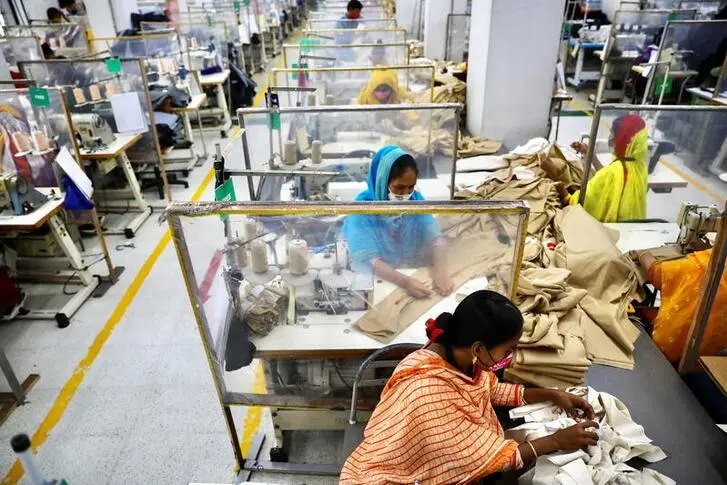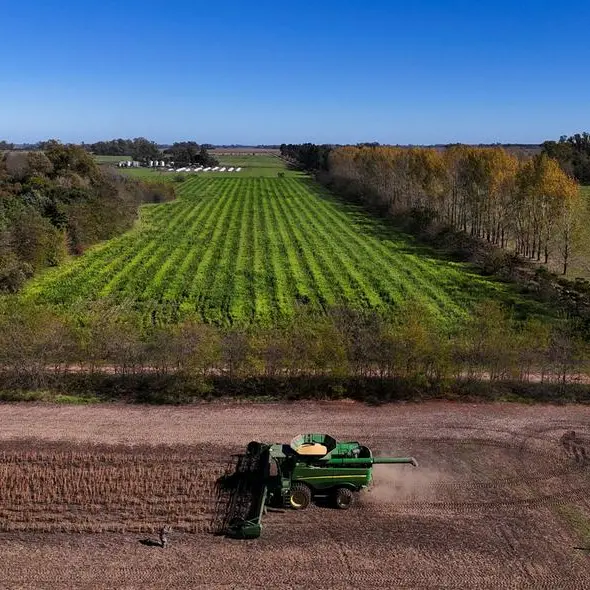PHOTO
Abu Dhabi - Salman Fazlur Rahman, a member of Parliament and Investment Adviser to the Prime Minister of Bangladesh, Sheikh Hasina Wajed, is visiting Abu Dhabi to promote trade and business opportunities in South Asia’s fastest-growing economy.
Rahman is also the co-founder and vice-chairman of the BEXIMCO Group, one of Bangladesh’s largest private conglomerates.
Data shows that Bangladesh is the new Asian tiger on the lines of southeast Asian nations such as Singapore, Malaysia, Indonesia and Thailand in the 1990s, when the young country, which was born in 1971, was trying to find ground beneath its feet while fighting against a military dictatorship and establishing a vibrant democracy.
The new economic powerhouse in the Indian subcontinent recently opened the longest bridge on the mighty river Padma (The Ganges) — one of the most challenging infrastructure projects in the region.
The Phase 1 of Dhaka Metro Rail, which will be opened by the end of the year, promises to change the way people commute in one of the most congested cities in the world. Besides, a large tunnel will connect two sides of Chittagong, which will further boost the port city’s economy.
Khaleej Times spoke with Rahman on the sidelines of a Bangladesh-UAE Economic Cooperation seminar, which was held in Abu Dhabi on Tuesday, to get a sense of Dhaka’s investment outreach in the country and the wider region.
Bangladesh, which has 144,770 square kilometres of landmass, is smaller than the US state of Florida but is home to around 168 million people — half of America’s population. It is also a climate-victim country, prone to flood fury during monsoon and natural calamities every year. We’ve overcome these challenges to emerge as a leading destination in South Asia for foreign investments.
Our biggest asset is our human resources. One of our biggest challenges has been to empower and convert the vast population of 168 million people into human talents, which we have been able to achieve over the last 14 years under the dynamic leadership of Sheikh Hasina, the architect of modern and vibrant Bangladesh.
From the womenfolk in the rural areas to the underprivileged scattered all over the country, people are empowered and have become part of the production process. About four million workers, of whom 90 per cent of whom are women, fetch around $42.6 (Dh156.47) billion in foreign exchange through the export of readymade garments.
Our PM has provided political, economic and social stability and has steered Bangladesh out of a number of crises, including the 2008-09 global economic meltdown and the recent Covid-19 pandemic, to sustain a robust economic growth. Our gross domestic product (GDP) has remained consistently over 6 per cent in the last 14 years, except for 2020 when it declined to 5.3 per cent due to the pandemic.
As Bangladesh steps up its infrastructure development to accelerate its economic growth, we need foreign investments such as forging partnerships with friendly countries and large multinational corporations (MNCs).
I’m visiting the UAE to invite local business houses, investors and development partners to be part of our growth story. Come and invest in Bangladesh and benefit from the opportunities provided by us.
FDIs hit a three-year high last fiscal year making it the second-most favoured destination in South Asia after India, according to the World Investment Report. FDI grew 13 per cent to $2.9 (Dh10.65) billion in 2021-2022 financial year, from $2.5 (Dh9.18) billion in the previous year, according to the report released by the United Nations Conference on Trade and Development (UNCTAD) this year.
With the 2021-2022 inflows, our FDI stock rose to $21.5 (Dh78.97) billion. However, this isn’t enough. We need higher investment inflows to help us develop our economy faster.
We’re engaging with our key allies and investor community and making our case, highlighting the opportunities, favourable investment climate, giving them realistic projections on return on investment (RoI) and addressing their concerns, if any.
We’ve started conducting roadshows in key markets, such as the UAE, the United Kingdom (UK), the United States of America (USA), etc. As a result, the awareness has been built and investment flow is increasing.
One of the areas in the works is forging strategic and comprehensive economic partnerships with our key allies and creating a win-win situation for all our partners. These involve government-to-government and government-to-private sector dialogues.
The UAE’s investments into Bangladesh haven’t been significantly high, although many local businesses are planning to invest in the country. What are your plans to tap these investments? RAK Ceramics – one of the UAE’s leading companies — has invested in Bangladesh. This is a strong case in point. It shows how investments in Bangladesh have contributed to RAK Ceramic’s net profits. Some significant developments are taking place in the development of the economic relationship with the UAE, and you will hear the news at the right time. This year, two UAE-based private companies — Malabar Gold and Diamonds and Danube Home — have announced their foray into Bangladesh through strategic partnerships.
Saif Powertec, a Bangladeshi conglomerate, is going to operate direct shipping services between Bangladesh and the UAE, which will further provide a boost to two-way trade and investments between the two countries. However, the potential is quite high, and I admit we haven’t seen its peak yet.
Yes, we’re certainly looking into these areas. However, we need to develop a large asset base for Sovereign Wealth Funds (SWFs) to invest. Investment by SWFs takes time to materialise. We’re building our capital markets for SWFs to invest in lucrative equities such as stocks, bonds and fixed income assets. Once our asset base improves further, SWFs will invest in them.
We’ve held a series of talks with a number of UAE-based port and free zone operators and logistics providers to consider investing in Bangladesh. These are on-going talks and are likely to materialise soon.
In addition to the capital market, they could invest in technology, start-ups, small and cottage industries, food processing, financial technology companies, e-commerce businesses, agro-based start-ups, etc.
Ours is an investment-friendly country with a pro-investment regime in power. Bangladesh has relaxed its investment policies to attract foreign investments. Besides the five-to 10-year tax holiday offered to foreign investors, Bangladesh allows full repatriation of capital and profits, offering higher RoI as well.
Through investment in a number of new industries, such as e-commerce, start-ups, etc.
I think there is a negative perception about Bangladesh and a lack of proper understanding of our country’s economy.
How is the ease of doing business since the ranking was 168 out of 190 in 2019?
We’re doing well, although the World Bank has stopped issuing the Doing Business Report, unfortunately. If it had continued, the report would have shown that Bangladesh has done much better in its international ranking.
Investment into the equity market can boost liquidity in the local capital market as well as the domestic economy in a number of ways and we’re looking into these areas. Bangladesh Securities and Exchange Commission has conducted several investment conferences in global cities such as Dubai, Singapore, London, New York and San Francisco to boost investments into our capital markets.
Copyright © 2022 Khaleej Times. All Rights Reserved. Provided by SyndiGate Media Inc. (Syndigate.info).




















